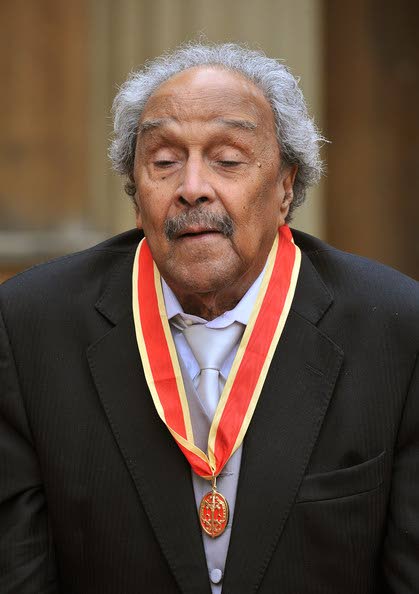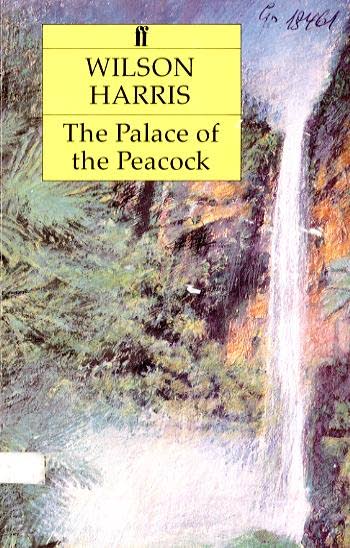Sir Harris lives on

One of Guyana’s most celebrated writers, Wilson Harris, died on Thursday in England, where he had lived for many years. His family announced his death in a statement on the day he died.
Harris’s first book, Palace of the Peacock, published in 1960, remained his best known, and is a seminal piece of Caribbean post-colonial literature. It was also the first of his Guyana Quartet, which was recently reissued in a single volume.
He also wrote 22 other novels, as well as poetry, essays and speeches. In 1987, Tariq Ali of Bandung Productions adapted his novel Da Silva, Da Silva as a film for Channel 4 television.
Harris attended Queens College, Guyana from 1932–1937. From 1945 to 1959 (when he migrated to England), he worked as a land surveyor, mainly in the sprawling interior of Guyana, where he encountered the country’s indigenous people. Nicholas Laughlin, programme director of TT’s NGC Bocas LitFest, wrote of him on Thursday that Harris’s experiences “in that vast, time-warping landscape – parts of which can seem simultaneously ancient and utterly new – together with his intense reading of philosophy and contemplation of mythology, shaped a transcendent consciousness always pushing against the frontiers of realism, if not of reality itself…”
As a result, Harris’s work could be difficult to approach, but Laughlin described him as having “one of Caribbean literature’s most electrifying minds.”
In a 1987 interview in the UK Observer Harris is quoted as saying, “Our humanity is impoverished when we seize on either tradition or identity…I am not interested in a multi-cultural community but in a cross-cultural community, in ways in which a myth in one can find parallels in the other. I look to create a kind of community that has a literacy of the imagination in it, that can unlock polarisations and fanaticisms that bedevil us.”
The interviewer, Moira Paterson, commented: “He speaks as he writes, in organic images of such astounding force and fecundity that the listener can only grasp some of the evolving ideas and hope to hang on.”
Laughlin explained, “His response to the nightmare of history is a deliberate bewildering of the boundaries of culture, politics, and language with which humankind has divided and delimited the natural world and our own imaginations. He is a writer who will astonish us for generations to come, and whose achievements are yet to be fully apparent. We are still learning how to read him.”
Likewise, Guyanese writer and dramatist Michael Gilkes wrote of Harris in 1970 that “one is aware of a remarkable intellect behind the quality of connectedness that runs throughout Harris’ work…Harris appeals to the open-minded, imaginative reader, and accepts the risk (much as CG Jung did with the field of psychology) of being dismissed as ‘obscure’ or ‘eccentric.’”

Of Harris’s last novel, The Ghost of Memory, Guyanese reviewer Brendan de Caires wrote in the Caribbean Review of Books in 2007: “Most of us think about the past as a constellation of human events, harmlessly inert and devoid of any texture. Wilson Harris, a surveyor who grew tired of maps, has spent decades rediscovering these hidden relations, urging us to consider the redemptive possibilities of a re-imagined past.”
While still living in Guyana, Harris was close to contemporary literary figures who included the poet Martin Carter, AJ Seymour, Ivan Van Sertima and Sidney King (Eusi Kwayana).
Harris, who died in Chelmsford, Essex, northeast of London, was knighted in 2010.
He had received literary prizes that included the Guyana Prize for Literature (1987 and 2002), as well as honorary degrees from the University of the West Indies (1984) and University of Liege in Belgium (2001).
His wife of 50 years, Margaret, died in 2010. Harris is survived by four children, who include Prof Nigel Harris, chancellor of the University of Guyana and a former vice chancellor of the University of the West Indies.
Harris was unable ever to attend the NGC Bocas Lit Fest in Port of Spain owing to the state of his health, but Laughlin said, “We were proud to mark his 95th birthday at our 2016 festival with readings from his books and a discussion of his legacy.”
Wilson Harris’s death shortly before his 97th birthday is a loss to Caribbean and world literature, Laughlin wrote: “But Harris’s own notion of quantum reality is a consolation: open his books, read his words, and he lives.”

Comments
"Sir Harris lives on"